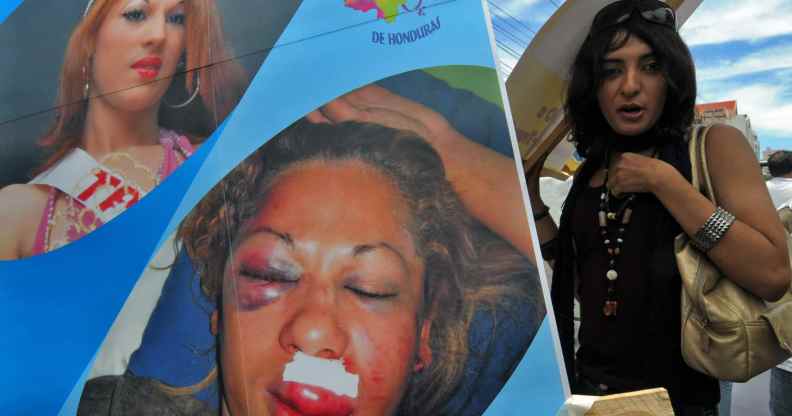Court could force Honduras to stop heinous, horrifying ‘social cleansing’ of trans people

LGBT+ activists protest against police abuse in Honduras in 2009 (ORLANDO SIERRA/AFP/ Getty)
A top human rights court could be about to make legal history by forcing Honduras to address its horrifying wave of violence against trans women.
International LGBT+ advocates are waiting anxiously for the verdict of the Inter-American Commission on Human Rights, which monitors human rights in the western hemisphere.
The top tribunal was prompted to intervene last year in Honduras, the country with world’s highest rate of trans homicides. Experts put the average life expectancy of transgender women at just 30 to 35 years.
“They call it social cleansing,” said Claudia Spellmant, a trans activist who fled the country in 2013, speaking to the New York Times. “They don’t want trans people on the street.”
The landmark legal case surrounds the death of Vicky Hernández, a Honduran trans woman whose murder has gone unsolved for 12 years.
26-year-old Hernández was allegedly shot dead by Honduran police during the country’s coup d’état in June 2009, with a slug of unknown caliber and a used condom found beside her body.
Twelve years later investigators still haven’t run forensic tests on that evidence, and it’s unclear whether the authorities even performed an autopsy.
“The case of Vicky Hernández is going to become extremely important milestone,” said Victor Madrigal-Borloz, a UN expert on gender identity discrimination.
The petitioners acting for the deceased, Cattrachas Lesbian Network and RFK Human Rights, argue that the government bore direct responsibility for Hernández’s death.
They say that in failing to conduct an effective investigation into her killing, including whether it was motivated by anti-LGBT+ prejudice, Honduras violated her right to life under the American Convention on Human Rights.
The Honduran government strongly denies any responsibility for Hernández’s death and says there is no evidence that the police were involved in her killing.
The case was heard before the Inter-American Commission in a virtual hearing in November, and with the historic ruling now imminent, activists await a decision that could set an incredible precedent across Latin America.
“We are watching very closely as to how the result of the case could impact the situation in the region,” said Bruna Benevides, a researcher for Brazil’s National Association of Transvestites and Transsexuals.
Rihanna Ferrera, who lost her run for office in Honduras in 2017 under her male birth name, said the case was important because it could force the government to at least make some tangible improvements, like allowing legal name changes.
Ferrera’s sister, Bessy, who was also transgender, was murdered in 2019.
“After what happened to my sister, I decided not to leave and instead to confront this discrimination, stigma, violence and criminalisation,” she said.
“We need not to remove people from the danger. We need to confront the state and tell the state: Here we are, and we are in danger. We don’t have to leave. You, as the government, have to solve this.”

